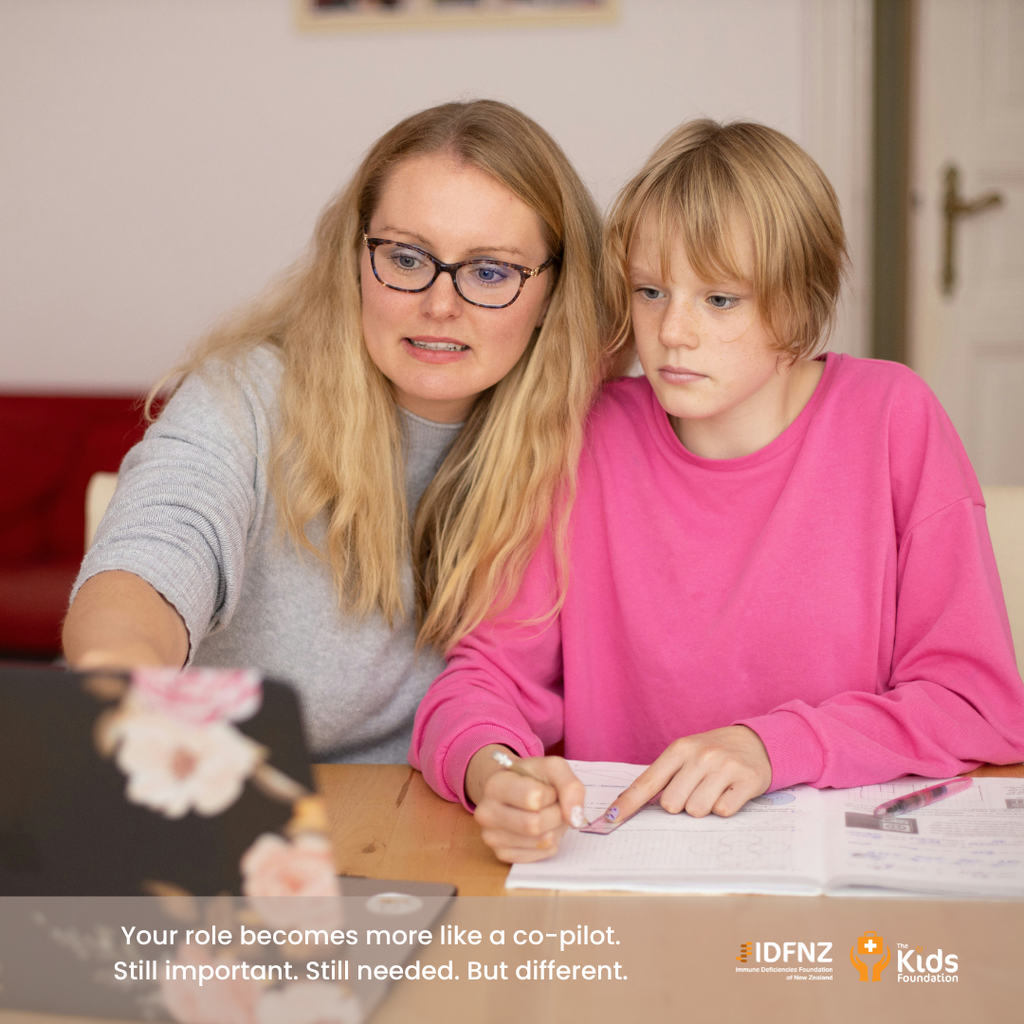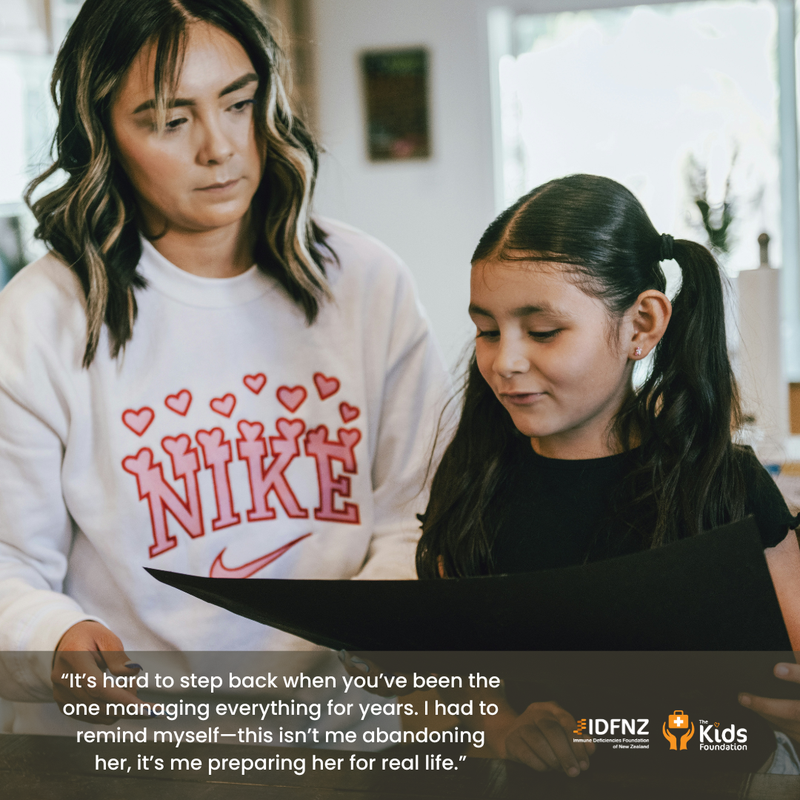Life In the Hospital Lane - A Parent and Caregiver Perspective of Health Transition
Fri Aug. 22nd 2025

When your child was little, you were the keeper of all things medical. You booked the appointments, filled the prescriptions, juggled the specialist reports, and probably knew your child’s health history better than your own. You were the driver - literally and figuratively - getting them to the hospital, talking to the doctors, and steering the course of their care.
But as your child grows into a young adult, something important begins to shift. The steering wheel, once firmly in your hands, starts to pass to them. Slowly, they begin to take the driver’s seat, and your role becomes more like a co-pilot. Still important. Still needed. But different.
Childhood: The manager years
During childhood, healthcare is a family affair. Parents or caregivers often do everything, from monitoring symptoms and managing medication schedules to liaising with schools and advocating for services. It’s an intense and deeply involved role, and it makes sense. Children aren’t developmentally ready to manage their health alone. They need guidance, reminders, and support. If you’re a parent of a child with a longterm condition, you’ve likely learned to be part-nurse, part-administrator, and full-time advocate. You’ve gathered wisdom through years of lived experience; how to manage appointments, what to say to clinicians, when to push back, and where to find support. These are hard-earned skills. And now, you’re being asked to start handing those over.
Adolescence: Handing over the tools
Think of adolescence like a construction zone. Everything’s under renovation. Your child is developing physically, emotionally, socially, and yes, cognitively. Their brain is slowly building the ability to make complex decisions, assess risks, and plan ahead. It doesn’t all come at once, but it’s a crucial time to start preparing them to manage their own care. One useful analogy is teaching your teenager to cook. At first, they watch you. Then they help stir the sauce. Eventually, they cook a simple meal under supervision. With time and practice, they can make dinner on their own. Healthcare works the same way. At first, your child might join in on appointments and learn how to describe their symptoms. Then they might start answering the doctor’s questions directly. Over time, they’ll learn to manage their medications, call the clinic, and advocate for themselves. The goal isn’t to push them into adulthood overnight. It’s to equip them with the tools they need to thrive when you’re not in the room.
As one parent described it: “It’s hard to step back when you’ve been the one managing everything for years. I had to remind myself—this isn’t me abandoning her, it’s me preparing her for real life.” - Mereana, parent of a 17-year-old with cystic fibrosis
That shift - from full control to gentle guidance - is one of the most powerful and challenging steps in the healthcare transition process.
Your Role: Preparing and Empowering
One of the most valuable things you can do during this time is to prepare your young person, not just medically but holistically. This means talking about:
• What their condition is and how it affects them
• How to manage medications and treatments
• How to book and attend appointments
• What to do if symptoms change or something goes wrong
• How to talk to health professionals with confidence
You don’t need to have all the answers - but you can help them learn how to find them. Model the kind of engagement you hope to see. Show them how you write down questions before appointments. Let them hear you clarify instructions or ask for a second opinion. These small moments are powerful lessons. Even if your child seems disinterested now, they’re watching and absorbing more than you think. And sometimes, it’s the small wins that mean the most:
“The first time he called the pharmacy on his own, I nearly cried. It felt small— but it was huge. That’s when I knew we were getting somewhere.” - James, father of a teen with a heart condition
These early steps build the foundation for independence and self-advocacy later on.

Letting go: Shifting roles, not rejection
For many parents, letting go is the hardest part. After years of being so closely involved in your child’s care, it can feel like you’re being pushed out. But this isn’t rejection. It’s progress. It’s not that you’re no longer needed, your role is changing. From manager to mentor. From decision-maker to advisor. From doing for them to doing with them. This change can bring up all kinds of emotions. Pride, anxiety, grief, even fear. That’s normal. It can feel like stepping off the stage after a long performance. But take heart: your influence continues, just in a quieter, more behind-the-scenes way
Trust the process – Even if it feels messy
Let’s be honest: transitions are rarely smooth. There will be bumps in the road. Missed doses, forgotten appointments, awkward silences in clinic rooms. But those mis-steps are part of learning. Remember when your child first learned to ride a bike? There were falls, wobbles, and scraped knees - but neither of you gave up. You kept running alongside them until they could pedal on their own. That’s what this stage is about, alongside until they are ready on their own. Rather than fighting the process, try to support it. Encourage your young person to practice independence in safe, supported ways. Let them make the phone call to refill their prescription, even if you’re sitting beside them. Let them speak first in appointments, even if you have to bite your tongue. These moments help build confidence. And when things go wrong - which they sometimes will - resist the urge to take over completely. Instead, debrief together: “What happened? What could you do differently next time?” That’s how real, lasting skills are built.
Passing on what you’ve learned
You know your child’s health story better than almost anyone. That history of symptoms, treatments, flare-ups, specialists, and personal preferences is incredibly valuable. As your young person prepares to move into adult care, one of your jobs is to help pass that knowledge on. This might mean:
• Writing a short summary of their health history together
• Creating a medication list or timeline of important events
• Sharing practical tips you’ve learned (“This medication works best after food,” or “That specialist likes it when you bring a written list of concerns”)
It can also mean encouraging your child to build their own system for managing their care. Some like apps. Others prefer notebooks. The method doesn’t matter as much as the mindset: that they are capable, prepared, and supported.
Reframing the transition: A shared success
Parents often ask: What if they’re not ready? What if I’m not ready?
The truth is, no one feels completely ready at first. Like most things in parenting, it’s not about perfection, it’s about progress. If your young person forgets something or needs reminders, that’s okay. The aim isn’t for them to be fully independent the moment they turn 18. It’s to help them grow toward independence, with you walking beside them; offering encouragement, backup, and the occasional nudge. This transition isn’t just a milestone for them. It’s a milestone for you, too. It’s a sign that you’ve done your job well, that you’ve raised someone who can take charge of their health and future. And just like teaching them to cross the street or pack a school lunch, this process is a gift. You’re helping them gain a skill that will serve them for life.

Final thoughts: You’re still part of the team
You may not be the primary driver anymore, but you’re still in the car. You’re still helping navigate, offering snacks, and changing the playlist when things get tense. And just like a GPS, your presence is reassuring - even when they don’t follow every instruction. So keep encouraging. Keep modeling. Keep supporting. This journey is theirs to take - but they’ll always remember who first showed them the way
